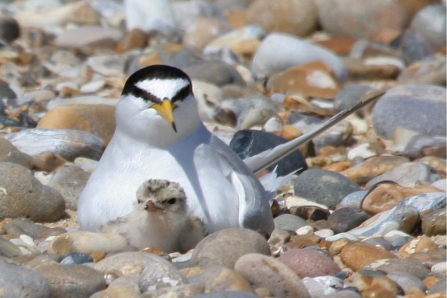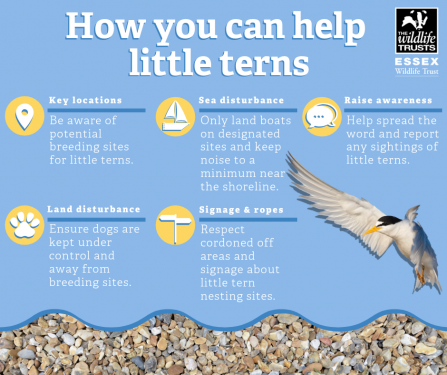The little tern is the UK’s smallest tern and they travel over 5,000 km each year to breed on our shores. Historically, the Essex coast supported a healthy population of nesting little terns, but the last few decades have seen catastrophic declines for this charismatic seabird.
Help protect Essex’s smallest seabird
Photo: Amy Lewis

Little Tern with chick
Photo: Margaret Holland
Facing the ongoing challenge of finding safe beaches to safely nest on, these birds now have to factor in increasing sea levels, more frequent storm events and disturbance from humans. In order to help these birds, Essex Wildlife Trust and the RSPB are asking the public to raise awareness and turn the tide for little terns in Essex.
The conservation charities have been working in collaboration over the past three years to create optimum little tern habitat along their coastal nature reserves. The project has involved deploying life-sized decoys and sound recordings in the Blackwater and Colne estuaries, to encourage the birds to breed in these safe areas. Last year saw promising signs, with six pairs of little terns nesting in the Blackwater and Colne estuaries, the highest number for a century.
By carrying out habitat maintenance and working together with the public to raise awareness and reduce disturbance, little terns will have the best chance of future success.
Essex Wildlife Trust and the RSPB are calling on the public to help these birds thrive in Essex through respecting these five areas:
- Little terns lay their eggs close to the shoreline on sand and shingle beaches, where their eggs are well camouflaged. Familiarise yourself with potential breeding locations and habitats where the terns would spend the May-August summer months.
- Respect all signage, instructions and roped off areas on any little tern nesting sites. Keeping these areas secluded gives these birds the best chance of survival.
- Reduce the possibility of disturbance on land by keeping a safe distance from designated little tern breeding sites and especially ensuring dogs are always kept under control and away for roped off areas.
- Reduce the disturbance on the water by only landing boats on designated sites, keeping water sports away from the shorelines and minimising noise near breeding sites.
- Help raise awareness about little terns, informing others of ways they can help protect these seabirds and notifying Essex Wildlife Trust and the RSPB if any nesting little terns are spotted
Last year showed that our joint efforts are having a positive impact on these delightful seabirds, but they’re incredibly sensitive to disturbance from humans. Encouraging people to be aware of little tern nesting sites over the summer months will help give these charismatic birds the best chance of breeding successfully and re-establishing healthy populations in Essex.
It’s so important that we all work together to protect our amazing little terns. Together we’ve started to make waves in the protection of these birds, but we need everyone’s help to give them the best chance of survival on the Essex coast. We hope to see healthy established populations emerging on our beaches over the coming years.

